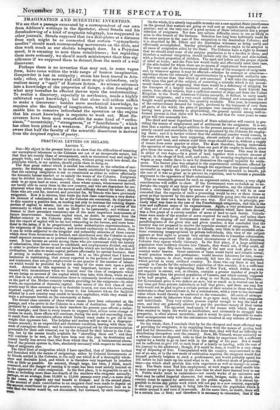IMAGINATION AND SCIENTIFIC INVENTION.
Ws see that a passage excavated by a correspondent of our own from Addison's writings in the Spectator, about Strada and his foreshadowing of a kind of magnetic telegraph, has reappeared in other journals. Strada supposed that two dial-plates at a distance from each might be so connected that certain "sympathetic needles" should mark corresponding movements on the dials, and thus work much as our electric telegraph does. In a Pepysian mood, it is amusing to note these coincidences ; but regarding them more seriously, we should much misinterpret their true sig- nificance if we supposed them to detract from the merit of a real discoverer.
Perhaps there is no invention that may not, in some vague form, have come within the wide range of human imagination. Gunpowder is lost in antiquity ; steam has been traced to Aris- totle; ether, or the newer and still more magic chloroform, only realizes many a " spell" of Eastern fiction. As science advances into a knowledge of the properties of things, a dim foresight of what may hereafter be effected dawns upon the understanding. To realize a discovery, especially in mechanics, needs a highly cultivated exact knowledge ; but that alone will seldom suffice to make a discoverer: besides mere mechanical knowledge, he requires also the faculty of imagination, which is necessary to enable him to conceive beforehand the operation or the engine that his exact knowledge is requisite to work out. Most dis- coverers have been men remarkable for some kind of " enthu- siasm," "eccentricity," "strangeness," or "fancifulness"; which has often been pitied as a weakness. Fur plodding minds are not aware that half the faculty of the scientific discoverer is derived from the despised region of poetry.


























 Previous page
Previous page